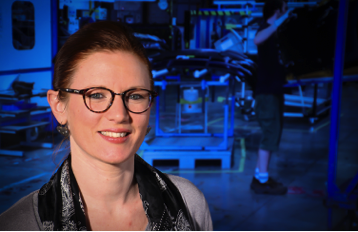Edwige Quillerou, Ph.D., is an occupational psychologist, specialist in occupational Health & Safety. She is employed at INRS, the National Research and Safety Institute for the Prevention of Diseases and Accidents at Work. She got her doctorate. in Psychology from CNAM (Ecole Nationale Supérieure des Arts et Métiers Industriels) in 2011: "The psychological and social functions of a group of peers to promote health at work: a case study on the activity of operators in the industry automobile”. His thesis is about an intervention in the automotive industry. She applied a new methodology of group dynamics to change the organization of work and prepare future projects for the development of workplaces. She also held a master's degree in ergonomics and psychology of work and a master's degree in epistemology in psychology.
She contributes to both research and company interventions for employees and employers. Her qualitative and clinical approach focuses on human activity, work organization, collective dynamics and the layout of workplaces. She works with multidisciplinary teams recommending frameworks and methodologies to develop the quality of work while promoting healthy work environments for workers. Its goals are to promote changes in the workplace for greater health and safety and to improve the quality of work, which supports and builds a better world. It is involved in interdisciplinary collaborations with various specialists in the human sciences as well as in engineering sciences to improve the technical environment, the organization of risk prevention and human development (individuals and teams).
She developed a scientific collaboration between INRS and FIT (Florida Institute of Technology) to work with the HCDi (Human Centered Design Institute). It was about sharing our research and our ways of helping workplace designs, considering human activity first throughout a design project. Within the HCDi team, she worked with designers and engineers on aeronautical projects towards the design of new technological work tools concerning new work situations and organizations (eg: OWSAS Project). This collaboration has resulted in the development of a design improvement methodology allowing progress to help industrial designers in companies to focus on Human Activity at work, in order to prevent occupational risks, as well as to contribute to healthier work environments for workers. .
She coordinated the book “Risk Taking, Prevention and Design: A Cross-Fertilization Approach.” with Professor Guy André Boy, published by CRC Taylor & Francis.
She is a member of the International Ergonomics Association (IEA) and the International Council for Systems Engineering (INCOSE). She is a major contributor to the INCOSE Human Systems Integration Task Force for the revision of the Systems Engineering Handbook and the development of the HSI Primer. She is a research scientist associated with the FlexTech chair.

